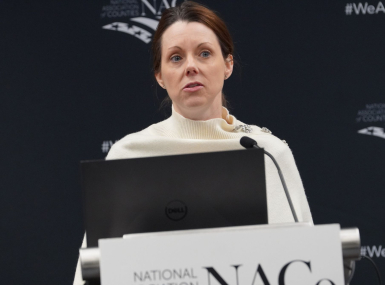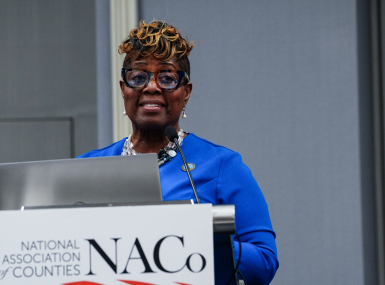Authorize Resources for County Veteran Service Officers (CVSOs)

Author
Upcoming Events
Related News
ACTION NEEDED
Urge your Members of Congress to pass the Commitment to Veteran Support and Outreach Act (H.R. 984/S.106), which would authorize federal funding to expand and strengthen County Veteran Service Officers (CVSOs).
BACKGROUND
CVSOs are local county employees who are nationally accredited by the VA to prepare, present, and prosecute U.S. Department of Veterans Affairs (VA) claims. Often, CVSOs are veteran’s first point of contact in the community for accessing services. CVSOs assist veterans in accessing a range of benefits, including service- connected benefits, enrollment in VA health care, VA home loans, education benefits and available job placement assistance. Veterans are not always aware of the benefits available to them, and CVSOs are often the first to inform them about their eligibility.
CVSOs operate in 29 states (see appendix) and perform much of the VA’s legwork for filing claims in their counties. This relatively small workforce is responsible for successfully processing more than $50 billion in direct compensation, pension, health care and other benefits for veterans each year. CVSOs are often the first and most frequent point of contact for veterans, family members and caregivers as they navigate the complex intergovernmental chain of veterans services and resources.
Though CVSOs’ primary focus is helping veterans navigate the federal benefits system, these offices are currently funded almost entirely by counties, which creates challenges for areas with high demand or counties that serve veterans in rural areas. Local resource constraints can significantly hinder the ability of county governments to expand our CVSO staff and services to sufficiently meet rising caseloads, resulting in long waiting lists that compound ongoing backlog issues at the VA. There is currently no federal funding directly available for CVSOs.
The Commitment to Veteran Support and Outreach (CVSO) Act (H.R. 984/S. 106) has been re-introduced in the 118th Congress by Reps. Mike Levin (D-Calif.), Chris Pappas (D-N.H.), Brad Finstad (R-Minn.) and Cathy McMorris Rodgers (R-Wash.) and Sens. Tammy Baldwin (D-Wis.) and Dan Sullivan (R-Alaska). The legislation would offer federal funding for CVSOs for the first time, authorizing award grants to expand and support CVSOs, Tribal VSOs or similar local government entities. The VA would award competitive grants to CVSOs, through the states, to create, expand or support CVSOs or similar local entities, prioritizing areas with high rates of veteran suicide, Veteran Crisis Line referrals or critical CVSO shortages.
Under the bill, states would submit an application containing a detailed plan for the use of these funds, demonstrating that the dollars will supplement and not supplant current state or local funding. The legislation would also direct the VA Secretary to develop guidance for outcome measures to determine the effectiveness of the programs. Funding may also be used to hire new or additional CVSO and provide technical and accreditation training for existing staff to serve veterans more effectively. States without CVSOs would also benefit under this legislation, as it would allow the VA Secretary to partner with state, local or tribal entities to improve service delivery. NACo urges Congress to swiftly pass this bill, which will greatly increase access to the federal benefits our veterans deserve.
The CVSO Act is currently supported by NACo, the National Association of County Veteran Service Officers (NACVSO), the National Association of State Directors of Veterans Affairs (NASDVA), the American Legion, the Disabled American Veterans (DAV), the Wounded Warrior Project (WWP), the Military Officer's Association of America (MOAA), the America's Warrior Partnership (AWP) and the American Foundation for Suicide Prevention (AFSP).
KEY TALKING POINTS
- County Veteran Service Officers (CVSOs) are local county employees who are nationally accredited by the VA to prepare, present, and prosecute U.S. Department of Veterans Affairs (VA) claims
- CVSOs operate in 29 states and are responsible for helping veterans obtain more than $50 billion annually in federal health, disability, pension and compensation benefits
- Though CVSOs’ primary focus is helping veterans navigate the federal benefits system, these offices are currently funded almost entirely by counties, which creates challenges for areas with high demand or counties that serve veterans in rural areas
- The Commitment to Veteran Support and Outreach (CVSO) Act would authorize federal competitive grant funding to expand and support CVSOs or similar local entities
- The new personnel resources outlined under the CVSO Act would enable counties to better meet the needs of local veterans and are especially critical given the significant expansion of VA benefits under the recently enacted Honoring Our Pact Act
Featured Initiative
Operation Green Light for Veterans
During the week leading up to Veterans Day, counties shine a green light to show support for veterans, raise awareness of benefits available to them and call for action on federal policies that support veterans and their families.







